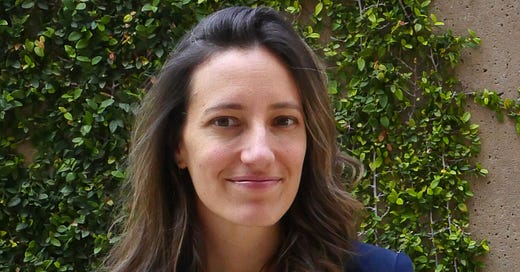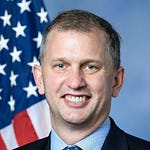In this episode, environmental social scientist Holly Jean Buck discusses the critique of emissions-focused climate policy that she laid out in her book Ending Fossil Fuels: Why Net Zero Is Not Enough.
Text transcript:
David Roberts
Over the course of the 2010s, the term “net-zero carbon emissions” migrated from climate science to climate modeling to climate politics. Today, it is ubiquitous in the climate world — hundreds upon hundreds of nations, cities, institutions, businesses, and individuals have pledged to reach net-zero emissions by 2050. No one ever formally decided to make net zero the common target of global climate efforts — it just happened.
The term has become so common that we barely hear it anymore, which is a shame, because there are lots of buried assumptions and value judgments in the net-zero narrative that we are, perhaps unwittingly, accepting when we adopt it.
Holly Jean Buck has a lot to say about that. An environmental social scientist who teaches at the University at Buffalo, Buck has spent years exploring the nuances and limitations of the net-zero framework, leading to a 2021 book — Ending Fossil Fuels: Why Net Zero Is Not Enough — and more recently some new research in Nature Climate Change on residual emissions.
Buck is a perceptive commentator on the social dynamics of climate change and a sharp critic of emissions-focused climate policy, so I'm eager to talk to her about the limitations of net zero, what we know and don't know about how to get there, and what a more satisfying climate narrative might include.
So with no further ado, Holly Jean Buck. Welcome to Volts. Thank you so much for coming.
Holly Jean Buck
Thanks so much for having me.
David Roberts
It's funny. Reading your book really brought it home to me how much net zero had kind of gone from nowhere to worming its way completely into my sort of thinking and dialogue without the middle step of me ever really thinking about it that hard or ever really sort of like exploring it. So let's start with a definition. First of all, a technical definition of what net zero means. And then maybe a little history. Like, where did this come from? It came from nowhere and became ubiquitous, it seemed like, almost overnight. So maybe a little capsule history would be helpful.
Holly Jean Buck
Well, most simply, net zero is a balance between emissions produced and emissions taken out of the atmosphere. So we're all living in a giant accounting problem, which is what we always dreamed of, right? So how did we get there? I think that there's been a few more recent moments. The Paris agreement obviously one of them, because the Paris agreement talks about a balance between anthropogenic emissions by sources and removals by sinks. So that's kind of part of the moment that it had. The other thing was the Special Report on 1.5 degrees by the Intergovernmental Panel on Climate Change, which further showed that this target is only feasible with some negative emissions.
And so I think that was another driver. But the idea of balancing sources and sinks goes back away towards the Kyoto Protocol, towards the inclusion of carbon sinks, and thinking about that sink capacity.
David Roberts
So you say, and we're going to get into the kind of the details of your critique in a minute. But the broad thing you say about net zero is that it's not working. We're not on track for it. And I guess intuitively, people might think, well, you set an ambitious target and if you don't meet that target, it's not the target's fault, right. It's not the target's reason you're failing. So what do you mean exactly when you say net zero is not working?
Holly Jean Buck
Well, I think that people might understandably say, "Hey, we've just started on this journey. It's a mid-century target, let's give it some time, right?" But I do think there's some reasons why it's not going to work. Several reasons. I mean, we have this idea of balancing sources and sinks, but we're not really doing much to specify what those sources are. Are they truly hard to abate or not? We're not pushing the scale up of carbon removal to enhance those sinks, and we don't have a way of matching these emissions and removals yet. Credibly all we have really is the voluntary carbon market.
But I think the main problem here is the frame doesn't specify whether or not we're going to phase out fossil fuels. I think that that's the biggest drawback to this frame.
David Roberts
Well, let's go through those. Let's go through those one at a time, because I think all of those have some interesting nuances and ins and outs. So when we talk about balancing sources and sinks, the way this translates, or I think is supposed to translate the idea, is a country tallies up all of the emissions that it is able to remove and then adds them all up. And then what remains? This kind of stuff, it either can't reduce or is prohibitively expensive to reduce the so called difficult to abate or hard to abate emissions. Those are called its residual emissions, the emissions that it doesn't think it can eliminate.
And the theory here is then you come in with negative emissions, carbon reduction, and you compensate for those residual emissions. So to begin with, the first problem you identify is that it's not super clear what those residual emissions are or where they're coming from, and they're not very well measured. So maybe just explain sort of like, what would you like to see people or countries doing on residual emissions and what are they doing, what's a state of knowledge and measurement of these things?
Holly Jean Buck
So the state right now is extremely fuzzy. And so I'll just back up and say that my colleagues and I looked at these long term strategies that are submitted to the UNFCCC under the Paris Agreement. Basically, each country is invited to submit what its long term strategy is for reaching its climate goals. And so we've read 50 of those.
David Roberts
Goodness.
Holly Jean Buck
Yeah, lots of fun. And they don't have a standard definition of what these residual emissions are, although they refer to them implicitly in many cases. You can see the residual emissions on these graphs that are in these reports.
But we don't have a really clear understanding in most cases where these residual emissions are coming from, how the country is thinking about defining them, what their understanding of what's truly hard to abate is. And I emphasize with this being a challenge, because what's hard to abate changes over time because new technologies come online. So it's hard to say what's going to be hard to abate in 10 or 20 years.
David Roberts
Right.
Holly Jean Buck
But we could get a lot better at specifying this.
David Roberts
And this would just tell us basically without a good sense of residual emissions across the range of countries, we don't have a good sense of how much carbon removal we need. So is there something easy to say about how we could make this better? Is there a standardized framework that you would recommend? I mean, are any countries doing it well and precisely sort of identifying where those emissions are and explaining why and how they came to that conclusion?
Holly Jean Buck
So there's 14 countries that do break down residual emissions by sector, which is like the first, most obvious place to start.
David Roberts
Right.
Holly Jean Buck
So, number one, everybody should be doing that and understanding what assumptions there are about what sectors. And generally a lot of this is non-CO2 emissions and emissions from agriculture. There's some emissions left over from industry, too, but having clarity in that is the most obvious thing. And then I think that we do need a consistent definition as well as processes that are going to standardize our expectations around this. That's something that's going to evolve kind of, I think, from the climate advocacy community, hopefully, and a norm will evolve about what's actually hard to abate versus what's just expensive to abate
David Roberts
Kind of a small sample size. But of the 14 countries that actually do this, are there trends that emerge? Like, what do these 14 countries currently believe will be the most difficult emissions to eliminate? Is there agreement among those 14 countries?
Holly Jean Buck
Well, it's pretty consistent that agriculture is number one, followed by industry, and that in many cases, transport, at least short transport, light duty transport is considered to be fully electrified. In many cases, the power sector is imagined to be zero carbon. But I will also say that the United Kingdom is the only one that even included international aviation and shipping in its projection. So a long way to go there.
David Roberts
And this is not really our subject here. But just out of curiosity, what is the simple explanation for why agriculture is such a mystery? What are these emissions in agriculture that no one can think of a way to abate?
Holly Jean Buck
I mean, I think it varies by country, but a lot of it is nitrous oxide. A lot of it has to do with fertilizer and fertilizer production, fertilizer over application and I think obviously some of it is methane too from the land sector, from cows. So I think maybe that is considered a more challenging policy problem than industry.
David Roberts
Yeah, this is always something that's puzzled me about this entire framework and this entire debate is you look at a problem like that and you think, well, if we put our minds to it, could we solve that in the next 30 years? I mean, probably. You know what I mean? It doesn't seem versus standing up this giant carbon dioxide removal industry which is just a gargantuan undertaking. This has never been clear to me why people are so confident that carbon dioxide removal is going to be easier than just solving these allegedly difficult to solve problems over the next several decades.
I've never really understood that calculation.
Holly Jean Buck
I think it just hasn't been thought through all the way yet. But I expect in the next five years most people will realize that we need a much smaller carbon removal infrastructure than is indicated in many of the integrated assessment models.
David Roberts
Yeah, thank you for saying that. This is my intuition, but I just don't feel sort of like technically briefed or technically adept enough to make a good argument for it. But I look at this and I'm like which of these problems are going to be easier to solve? Finding some non-polluting fertilizer or building a carbon dioxide removal industry three times the size of the oil industry? It's crazy to view the latter as like, oh, we got to do that because we can't do the first thing. It just seems crazy. Okay, so for the first problem here with net zero is we don't have a clear sense of what these residual emissions are, where they come from, exactly how we define them, et cetera.
So without that, we don't have a clear sense of the needed size of the carbon dioxide removal industry. That said, problem number two here is that even based on what we are currently expecting CDR to do, there doesn't appear to be a coordinated push to make it happen. Like we're just sort of like waving our hands at massive amounts of CDR but you're not seeing around you the kinds of mobilization that would be necessary to get there. Is that roughly accurate?
Holly Jean Buck
Yeah, and I think it follows from the residual emissions analysis because unless a country has really looked at that, they probably don't realize the scale of CDR that they're implicitly relying on.
David Roberts
Right, so they're implicitly relying on CDR for a couple of things you list in your presentation I saw and residual emissions is only one of those things we're expecting CDR to do.
Holly Jean Buck
There's the idea that CDR will also be compensating for legacy emissions or helping to draw down greenhouse gas concentrations after an overshoot. I don't think anybody is saying that exactly because we're not at that point yet, but it's kind of floating around on the horizon as another use case for carbon removal.
David Roberts
Yeah. So it does seem like even the amount of CDR that we are currently expecting, even if most countries haven't thought it through, just the amount that's already on paper that we're expecting it to do, we're not seeing the kind of investment that you would want to get there. What does that tell you? What should we learn from that weird disjunct?
Holly Jean Buck
For me, it tells me that all the climate professionals are not really doing their jobs. Maybe that sounds mean, but we have so many people that are devoted to climate action professionally and so it's very weird to not see more thinking about this. But maybe the more nice way to think about it is saying oh well, people are really focused on mitigation. They're really focused on scaling up clean energy which is where they should be focused. Maybe that's reasonable.
David Roberts
Yeah, maybe this is cynical, but some part of me thinks, like if people and countries really believed that we need the amount of CDR they're saying we're going to need, that the models show we're going to need, by mid century they would be losing their minds and flipping out and pouring billions of dollars into this. And the fact that they're not to me sort of like I guess it feels like no one's really taking this seriously. Like everyone still somewhat sees it as an artifact of the models.
Holly Jean Buck
I don't know, I think the tech sector is acting on it, which is interesting. I mean, you've seen people like Frontier mobilize all these different tech companies together to do these advanced market commitments. I think they're trying to incubate a CDR ecosystem. And so why does interest come there versus other places? Not exactly sure. I have some theories but I do wonder about the governments because in our analysis we looked at the most ambitious projections offered in these long term strategies and the average amount of residual emissions was around 18% of current emissions. So all these countries have put forward these strategies where they're seeing these levels of residual emissions.
Why are they not acting on it more in policy? I think maybe it's just the short termism problem of governments not being accountable for things that happen in 30 years.
David Roberts
Yeah, this is a truly strange phenomenon to me and I don't even know that I do have any theories about it, but it's like of all the areas of climate policy there are tons and tons of areas where business could get involved and eventually build self-sustaining profitable industries out of them. But CDR is not that there will never be a self-sustaining profitable CDR industry. It's insofar as it exists, it's going to exist based on government subsidies. So it's just bizarre for business to be moving first in that space and for government to be trailing.
It just seems upside down world. I can't totally figure out government's motivations for not doing more and I can't totally figure out businesses motivations for doing so much.
Holly Jean Buck
Well, I think businesses acting in this R&D space to try to kind of claim some of the tech breakthroughs in the assumption that if we're serious about climate action we're going to have a price on carbon. We're going to have much more stringent climate policy in a decade or two. And when that happens, the price of carbon will be essentially set by the price of removing carbon. And so if they have the innovation that magically removes the most carbon, they're going to be really well set up for an extremely lucrative industry. This is all of course hinging on the idea that we're going to be willing to pay to clean up emissions just like we're willing to pay for trash service or wastewater disposal or these other kind of pollution removal services.
Which is still an open question, but I sure hope we will be.
David Roberts
Yeah, it's totally open. And this is another area where this weird disjunct between this sort of expansive talk and no walk. It's almost politically impossible to send money to this greenhouse gas international fund that's supposed to help developing countries decarbonize, right? Like even that it's very difficult for us to drag enough tax money out of taxpayers hands to fund that and we're going to be sending like a gazillion times more than that on something that has no visible short term benefit for taxpayers. We're all just assuming we're going to do that someday. It seems like a crazy assumption.
And if you're a business and you're looking to make money, it just seems like even if you're just looking to make money on clean energy, it seems like there's a million faster, easier ways than this sort of like multidecade bank shot effort. I feel like I don't have my head wrapped around all those dynamics. So the first problem is residual emissions. They're opaque to us, we don't totally get them. Second problem is there's no evident push remotely to scale of the kind of CDR we claim we're going to need. And then the third you mentioned is there's no regime for matching emissions and removals.
Explain that a little bit. What sort of architecture would be required for that kind of regime?
Holly Jean Buck
Well, you can think of this as a market or as a platform, basically as a system for connecting emissions and removals. And obviously this has been like a dream of technocratic climate policy for a long time, but I think it's frustrated by our knowledge capabilities and maybe that'll change in the future if we really do get better models, better remote sensing capacities. Obviously, both of those have been improving dramatically and machine learning accelerates it. But it assumes that you really have good knowledge of the emissions, good knowledge of the removals, that it's credible. And I think for some of the carbon removal technologies we're looking at this what's called MRV: monitoring, reporting, and verification.
Is really challenging, especially with open systems like enhanced rock weathering or some of the ocean carbon removal ideas. So we need some improvement there. And then once you've made this into a measurable commodity, you need to be able to exchange it. That's been really frustrated because of all the problems that you've probably talked about on this podcast with carbon markets, and scams, bad actors. It's all of these problems and the expense of having people in the middle that are taking a cut off of the transactions.
David Roberts
Yeah. So you have to match your residual emissions with removals in a way that is verifiable, in a way that, you know, the removals are additional. Right. You get back to all these carbon market problems and as I talked with Danny Cullenword and David Victor about on the pod long ago, in carbon offset markets, basically everyone has incentive to keep prices low and to make things look easy and tidy. And virtually no one, except maybe the lonely regulators has the incentive to make sure that it's all legit right there's just like there's overwhelming incentive to goof around and cheat and almost no one with the incentive to make sure it's valid.
And all those problems that face the carbon offset market just seem to me like ten times as difficult. When you're talking about global difficult to measure residual emissions coupled with global difficult to measure carbon dioxide removals in a way where there's no double counting and there's no shenanigans. Like, is that even a gleam in our eye yet? Do we even have proposals for something like that on the table?
Holly Jean Buck
I mean, there's been a lot of best principles and practices and obviously a lot of the conversation around Article Six and the Paris agreement and those negotiations are towards working out better markets. I think a lot of people are focused on this, but there's definitely reason to be skeptical of our ability to execute it in the timescales that we need.
David Roberts
Yeah, I mean, if you're offsetting residual emissions that you can't reduce, you need that pretty quick. Like, this is supposed to be massively scaling up in the next 30 years and I don't see the institutional efforts that would be required to build something like this, especially making something like this bulletproof. So we don't have a good sense of residual emissions. We're not pushing very hard to scale CDR up even to what we think we need. And we don't have the sort of institutional architecture that would be required to formally match removals with residual emissions. These are all kind of, I guess, what you'd call technical problems.
Like, even if you accepted the goal of doing this or this framework, these are just technical problems that we're not solving yet. The fourth problem, as you say, is the bigger one, perhaps the biggest one, which is net zero says nothing about fossil fuels. Basically. It says nothing about the socioeconomics of fossil fuels or the social dynamics of fossil fuels. It says nothing about the presence of fossil fuels in a net-zero world, how big that might be, et cetera. So what do you mean when you say it's silent on fossil fuels?
Holly Jean Buck
Yeah, so this was a desirable design feature of net zero because it has this constructive ambiguity around whether there's just like a little bit of residual emissions and you've almost phased out fossil fuels, or if there's still a pretty significant role for the fossil fuel industry in a net-zero world. And that's what a lot of fossil fuel producers and companies are debating.
David Roberts
Yes, I've been thinking about this recently in the context of the struggle to get Joe Manchin to sign decent legislation. Like, if you hear Joe Manchin when he goes on rambling on about climate change, it's very clear that he views carbon dioxide removal as basically technological license for fossil fuels to just keep on keeping on. Like, in his mind, that's what CDR means. Whereas if you hear like, someone from NRDC talking about it, it's much more like we eliminated almost everything. And here's like, the paper towel that we're going to use to wipe up these last little stains.
And that's a wide gulf.
Holly Jean Buck
I don't want to seem like the biggest net-zero hater in the world. I understand why it came up as a goal. I think it was a lot more simple and intuitive than talking about 80% of emissions reduction over 2005 levels or like the kind of things that it replaced. But ultimately, this is a killer aspect to the whole idea, is not being clear about the phase out of fossil fuels.
David Roberts
And you say you can envision very different worlds fitting under net zero. What do you mean by that?
Holly Jean Buck
Well, I mean, one axis is the temporality of it. So is net zero, like, just one moment on the road to something else? Is it a temporary state or is it a permanent state where we're continuing to produce some fossil fuels and we're just living in that net zero without any dedicated phase out? I think that right now there's ambiguity where you could see either one.
David Roberts
That is a good question. In your research on this, have you found an answer to that question of how people view it? Like, I'd love to see a poll or something. I mean, this is a tiny subset of people who even know what we're talking about here. But among the people who talk about net zero, do you have any sense of whether they view it as like a mile marker on the way to zero-zero or as sort of like the desired endstate?
Holly Jean Buck
You know, it's funny because I haven't done a real poll, but I've done when I'm giving a talk at a conference of scientists and climate experts twice I've asked this question, do you think it's temporary or do you think it's like a permanent desired state? And it's split half and half each time, which I find really interesting. Like, within these climate expert communities, we don't have a clear idea ourselves.
David Roberts
And that's such a huge difference. And if you're going to have CDR do this accounting for past emissions, for your past emissions debt, if you're going to do that, you have to go negative, right. You can't stay at net zero, you have to go net negative. So it would be odd to view net zero as the end state. And yet that seems like, what's giving fossil fuel companies permission to be involved in all this.
Holly Jean Buck
Yeah. No, we do need to go net negative. And I think one challenge with the residual emissions is that carbon removal capacity is going to be finite. It's going to be limited by geography, carbon sequestration capacity, ecosystems and renewable energy, all of these things. And so if you understand it as finite, then carbon removal to compensate for residual emissions is going to be in competition with carbon removal to draw down greenhouse gas concentrations. And so we never get to this really net negative state if we have these large residual emissions, because all that capacity is using to compensate rather than to get net negative, if that makes sense.
David Roberts
Yeah. Given how sort of fundamental those questions are and how fundamental those differences are, it's a little this is what I mean when I sort of the revelation of reading your book. Like, those are very, very different visions. If you work backwards from those different visions, you get a very, very different dynamic around fossil fuels and fossil fuel companies and the social and political valence of fossil fuels, just very fundamentally different. It's weird that it's gone on this long with that ambiguity, which, I guess, as you say, it was fruitful to begin with, but you kind of think it's time to de-ambiguize this.
Holly Jean Buck
Yeah. Because there's huge implications for the infrastructure planning that we do right now.
David Roberts
Right.
Holly Jean Buck
It's going to be a massive transformation to phase out fossil fuels. There's a million different planning tasks that need to have started yesterday and should start today.
David Roberts
Yeah. And I guess also, and this is a complaint, maybe we'll touch on more later, but there's long been, I think, from some quarters of the environmental movement, a criticism of climate people in their sort of emissions or carbon greenhouse gas emissions obsession. And when you contemplate fossil fuels, it's not just greenhouse gases. There's like all these proximate harms air pollution and water pollution, et cetera, et cetera, geopolitical stuff. And I think the idea behind net zero was, let's just isolate greenhouse gas emissions and not get into those fights. But I wonder, as you say, we have to make decisions now, which in some sense hinge on which we were going to go on that question.
Holly Jean Buck
Yeah, I mean, it was a huge trick to get us to focus on what happens after the point of combustion rather than the extraction itself.
David Roberts
Yeah, it says nothing about extraction, too. So your final critique of net zero fifth and final critique is that it is not particularly compelling to ordinary people, which I think is kind of obvious. Like, I really doubt that the average Joe or Jane off the street would even know what you mean by net zero or would particularly know what you mean by negative carbon emissions and if you could explain it to them, would be particularly moved by that story. So what do you mean by the meta narrative? Like, why do you think this falls short?
Holly Jean Buck
I mean, accounting is fundamentally kind of boring. I think a lot of us avoid it, right? And so if I try to talk to my students about this, it's really work to keep them engaged and to see that actually all this stuff around net zero impacts life and death for a lot of people. But we don't feel that when we just look at the math or we look at the curve and we talk about bending the curve and this and that, we have this governance by curve mode. It's just not working in terms of inspiring people to change anything about their lives.
David Roberts
Yeah, bending the curve didn't seem to work great during the pandemic either. This gets back to something you said before about what used to be a desirable design feature when you are thinking about other things that you might want to bring into a meta narrative about climate change. Most of what people talk about and what people think about is sort of social and political stuff. Like, we need to talk about who's going to win and who's going to lose, and the substantial social changes and changes in our culture and practices that we need. We need to bring all these things in.
But then the other counterargument is those are what produce resistance and those are what produce backlash. And so as far as you can get on an accounting framework, like if the accounting framework can sort of trick various and sundry participants and institutions into thinking they're in a value neutral technical discussion, if you can make progress that way, why not do it? Because any richer meta narrative is destined to be more controversial and more produce more political backlash. What do you think about that?
Holly Jean Buck
No, I think that the problem is we haven't invested at all in figuring out how to create desire and demand for lower carbon things. I mean, maybe the car industry has tried a little bit with some of the electric trucks or that kind of thing, but we have all this philanthropy, government focus, all the stuff on both the tech and on the carbon accounting pieces of it. We don't have very much funding going out and talking to people. About why are you nervous about transitioning to gas in your home? What would make you feel more comfortable about that?
Those sorts of relational things, the conversations, the engagement has been gendered, frankly. Lots of times it falls to women to do this kind of relational work and hasn't been invested in. So I think there's a whole piece we could be doing about understanding what would create demand for these new infrastructures, new practices, not just consumer goods but really adoption of lifestyle changes because you need that demand to translate to votes to the real supportive policies that will really make a difference in this problem.
David Roberts
Yeah, I very much doubt if you go to talk to people about those things they're going to say, well, I want to get the appliance that's most closely going to zero out my positive conditions. You're not going to run into a lot of accounting if you ask people about their concerns about these things. So these are the problems. We're not measuring it well. We're not doing what we need to do to remove the amount of CDR we say we need. We don't have the architecture or the institutional structures to create some sort of system where we're matching residual emissions and removals.
And as a narrative it's fatally ambiguous about the role of fossil fuels in the future and plus ordinary people don't seem to give much of a shit about it. So in this presentation you sort of raise the prospect that the whole thing could collapse, that the net-zero thing could collapse. What do you mean by that and how could that happen?
Holly Jean Buck
So I think this looks more like quiet quitting than anything else because I do think it is too big to fail in terms of official policy. There's been a lot of political capital spent.
David Roberts
Yeah, a lot of institutions now have that on paper, like are saying on paper that they want to hit net zero. So it seems to me like it would take a big backlash to get rid of it.
Holly Jean Buck
Yeah. So I don't think some companies may back away from targets. There'll be more reports of targets not being on track. And I think what happens is that it becomes something like the Sustainable Development Goals or dealing with the US national debt where everybody kind of knows you're not really going to get there, but you can still talk about it aspirationally but without confidence. Because it did feel like at least a few years ago that people were really trying to get to net zero. And I think that sensation will shift and it'll become empty like a lot of other things, unfortunately.
But I think that creates an opportunity for something new to come in and be the mainframe for climate policy.
David Roberts
Net zero just seems like a species of a larger thing that happens. I don't know if it happens in other domains, but in climate and clean energy it happens a lot, which is just sort of like a technical term from the expert dialogue, worms its way over into popular usage and is just awful and doesn't mean anything to anyone. I think about net metering and all these kind of terminological disputes. So it doesn't really I'm not sure who's in charge of metanarratives, but it doesn't seem like they're very thoughtfully constructed. So let's talk a little bit about what characteristics you think a better metanarrative about climate change would include.
Holly Jean Buck
First, I think it is important that we are measuring progress towards a goal for accountability reasons. But I think there needs to be more than just the metric. I think we have an obsession with metrics in our society that sometimes becomes unhealthy or distracts us from the real focus. But I do think there should be some amount of measuring specific progress towards a goal. I think that the broader story also has to have some affect or emotional language. There has to be some kind of emotional connection. I also think we have to get beyond carbon to talk about what's going on with ecosystems more broadly and how to maintain them and have an intact habitable planet and then just pragmatically.
This has to be a narrative that enables broad political coalitions. It can't be just for one camp and it has to work on different scales. I mean, part of the genius of net zero is that it is this multi-scalar planetary, but also national, also municipal, corporate, even individual does all of that. So those are some of the most important qualities that a new frame or a new narrative would have to have.
David Roberts
That sounds easier said than done. I can imagine measuring other things you mentioned in your book several sort of submeasurements other than just this one overarching metric. You could measure how fast fossil fuels are going away. You could measure how fast clean energy is scaling up. There are adaptation you can measure to some extent. So I definitely can see the benefit in having a wider array of goals, if only just because some of those just get buried under net zero and are never really visible at all. That makes sense to me. But the minute you start talking about a metanarrative with affect, with emotion, the way to get that is to appeal to people's values and things that they cherish and feel strongly about.
But then we're back to the problem we talked about earlier, which is it seems like especially in the US these days, we're just living in a country with two separate tribes that have very, very different values. And so the minute you step beyond the sort of technocratic metric, which in a sense is like clean and clinical and value free and start evoking values, trying to create emotion, you get greater investment and passion in some faction and alienate some other faction. Do you just think that that's like unavoidable and you have to deal with that or how do you think about that dilemma?
Holly Jean Buck
I actually think people do have the same values, but they're manipulated by a media ecosystem that profits from dividing them, which makes it impossible for them to see that they do have aligned values. And I base that just on my experience, like as a rural sociologist and geographer talking to people in rural America. People are upset about the same exact things that the leftists in the cities I visit are upset about too. They really do value justice. They think it's unfair that big companies are taking advantage of them. There are some registers of agreement about fairness, about caring for nature, about having equal opportunities to a good and healthy life that I think we could build on if we weren't so divided by this predatory media ecology.
David Roberts
I don't suppose you have a solution for that, in your back pocket?
Holly Jean Buck
I have a chapter on this in a forthcoming book which you might be interested. It's edited by David Orr. It's about democracy in hotter times, looking at the democratic crisis and the climate crisis at the same time. And so I've thought a little bit about media reform, but it's definitely not my expertise. We should have somebody on your podcast to talk about that too.
David Roberts
Well, let me tell you, as someone who's been obsessed with that subject for years and has looked and looked and looked around, I don't know that there is such thing as an expert. I've yet to encounter anyone who has a solution to that problem that sounds remotely feasible to me, including the alleged experts. And it kind of does seem like every problem runs aground on that, right? Like it would be nice if people had a different story to tell about climate change that had these features you identify that brought people in with values and drew on a broader sense of balance with the earth and ecosystems.
But even if they did, you have to have the mechanics of media to get that message out to tell that story. You know what I mean? And so you got one whole side of the media working against you and one at best begrudgingly working with you. It just doesn't seem possible. So I don't know why I'm talking to you about this problem. No one knows a solution to this problem. But it just seems like this is the -er problem that every other problem depends on.
Holly Jean Buck
Yeah, I mean, we should talk about it because it's the central obstacle in climate action, from my point of view, is this broken media ecosystem and if we could unlock that or revise it, we could make a lot of progress on other stuff.
David Roberts
Yes, on poverty, you name it. Almost anything that seems like the main problem you talk about. The narrative must be able to enable broad political coalitions, but you are working against ... I guess I'd like to hear a little bit about what role you think fossil fuels are playing in this? It seems to me pretty obvious that fossil fuels do not want any such broad political coalition about anything more specific than net zero in 2050, right. Which, as you point out, leaves room for vastly different worlds, specifically regarding fossil fuels. It seems like they don't want that and they're working against that and they have power.
So who are the agents of this new narrative? Like, who should be telling it and who has the power to tell it?
Holly Jean Buck
So I think sometimes in the climate movement we grant too much power to the fossil fuel industry. It's obviously powerful in this country and in many others, but we have a lot of other industries that are also relevant and powerful too. So you can picture agriculture and the tech industry and insurance and some of these other forms of capital standing up to the fossil fuel industry because they have a lot to lose as renewables continue to become cheaper. We should have energy companies that will also have capital and power. So I do think that we need to think about those other coalitions.
Obviously, I don't think it needs to be all grounded in forms of capital. I think there's a lot of work to be done in just democratic political power from civil society too. What I'd love to see is philanthropy, spending more money on building up that social infrastructure alongside funding some of this tech stuff.
David Roberts
Yeah, I've talked to a lot of funders about that and what I often hear is like, "Yeah, I'd love that too, but what exactly be specific, David, what do you want me to spend money on?" And I'm always like, "Well, you know, stuff, social infrastructure, media, something." I get very hand wavy very quick because I'm not clear on exactly what it would be. So final subject, which I found really interesting at the tail end, I think it's fair to say your sympathies are with phasing out fossil fuels as fast as possible. And there's this critique you hear from the left-left about climate change that just goes, this is just capitalism, this is what capitalism does.
This is the inevitable result of capitalism. And if you want a real solution to climate change on a mass scale, you have to be talking about getting past capitalism or destroying capitalism or alternatives to capitalism, something like that. Maybe I'm reading between the lines, but I feel like you have some sympathy with that. But also then we're back to narratives that can build a broad political coalition, right? Narratives that can include everyone. So how do you think about the tension between kind of the radical rethinking of economics and social arrangements versus the proximate need to keep everybody on board?
How is a metanarrative supposed to dance that line?
Holly Jean Buck
Yeah, unfortunately, I think in this media ecosystem we can't lead with smashing capitalism or with socialism. It's just not going to work, unfortunately. So then what do you do? I think you have to work on things that would make an opening for that. Having more political power, more power grounded in local communities. It's not going to be easy.
David Roberts
Even if you let the anti-capitalist cat out of the bag at all, you have a bunch of enemies that would love to seize on that, to use it to divide. So I don't know, what does that mean? Openings, just reforms of capitalism at the local level? I mean, I'm asking you to solve these giant global problems. I don't know why, but how do you solve capitalism? What's your solution to capitalism? What does that mean, to leave an opening for post-capitalism without directly taking on capitalism? I guess I'd just like to hear a little bit more about that.
Holly Jean Buck
So I think that there's a lot of things that seem unconnected to climate at first, like making sure we have the integrity of our elections, dealing with redistricting and gerrymandering and those sorts of things that are one part of it. Reforming the media system is another part of it. Just having that basic civil society infrastructure, I think, will enable different ideas to form and grow.
David Roberts
Do you have any predictions about the future of net zero? Sort of as a concept, as a guiding light, as a goal? Because you identify these kind of ambiguities and tensions within it that seem like it doesn't seem like it can go on forever without resolving some of those. But as you also say, it's become so ubiquitous and now plays such a central role in the dialogue and in the Paris plans and et cetera, et cetera. It's also difficult to see it going away. So it's like can't go on forever, but it can't go away. So do you have any predictions how it evolves over the coming decade?
Holly Jean Buck
Well, it could just become one of these zombie concepts and so that really is an opportunity for people to get together and think about what other thing they would like to see. Is it going to be measuring phase out of fossil fuels and having a dashboard where we can track the interconnection queue and hold people accountable for improving that? Are we going to be measuring adaptation and focusing on that? Are we going to be thinking more about the resources that are going to countries to plan and direct a transition and trying to stand up agencies that are really focused on energy transition or land use transition?
I mean, we could start making those demands now and we could also be evolving these broader languages to talk about and understand the motion. So we have some concepts that have been floated and already sort of lost some amount of credibility, like sustainability, arguably just transition. We have Green New Deal. Will that be the frame? Is that already lost? What new stuff could we come up with? Is it regeneration or universal basic energy. I think there's a lot of languages to explore and so I would be thrilled to see the Climate Movement work with other movements in society, with antiracist movements, with labor movements and more to explore the languages and the specific things we could measure and then take advantage of the slipperiness of net zero to get in there and talk about something else we might want to see.
David Roberts
Okay, that sounds like a great note to wrap up on. Thank you for coming. Thank you for the super fascinating book and for all your work, Holly Jean Buck. Thanks so much.
Holly Jean Buck
Thank you.
David Roberts
Thank you for listening to the Volts podcast. It is ad-free, powered entirely by listeners like you. If you value conversations like this, please consider becoming a paid Volts subscriber at volts.wtf. Yes, that's volts.wtf, so that I can continue doing this work. Thank you so much and I'll see you next time.
















Share this post